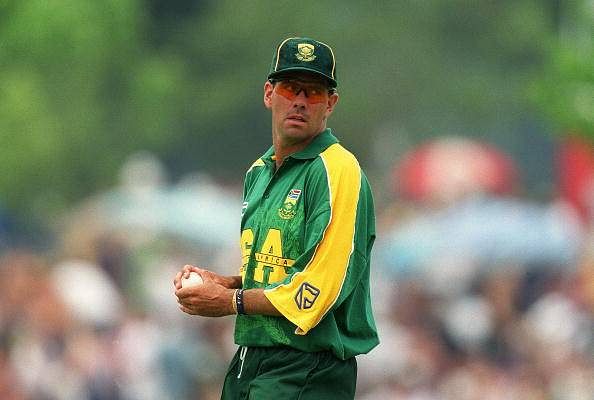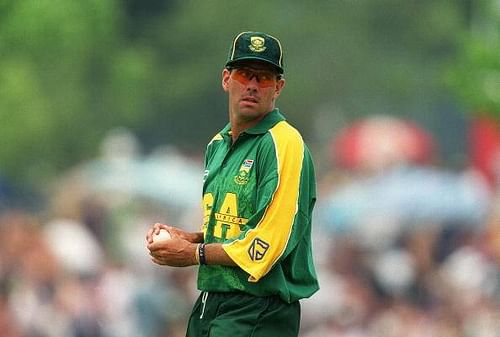
The Life and Times of Hansie Cronje

A naturally talented sportsman with amazing hand-eye coordination, a boyishly handsome born cricketer – Wessel Johannes Hansie Cronje was born in Bloemfontein, South Africa to Ewie Cronje and San-Marie Cronje on the 25th of September, 1969. Cronje showed early signs of sporting excellence, perhaps embedded in his genes courtesy his father Ewie cronje who was a first-class cricketer and commentator.
Hansie Cronje went on with life with full gusto, sure to become a big time sportsman – matriculating from his college in 1987 with the proud distinction of being the head boy and captaining his school’s cricket and rugby teams while also being the most valuable player for these teams.
Not surprisingly the first class team Orange Free State was quick enough to spot the sporting genius in him, giving him his first class debut against Transvaal at Johannesburg in January 1988 at the age of 18. Impressing the selectors with his performance, soon enough Cronje became a regular for his team. At the young age of 21, Cronje was made captain of Orange Free State for the 1990–91 season. Captaincy proved to be beneficial for his individual performance as well, he finished the season amassing 715 runs.
One of the greatest captains in cricket history
Cronje’s impressive form in the 1991-92 season was reason enough for him to get a national call-up, and he made his ODI debut for South Africa against Australia at the biggest stage of it all, the 1992 Cricket World Cup. He fared reasonably well at the tournament averaging 34.00 with the bat. Cronje became a South African regular since then, being a part of all of his team’s international tours and gaining experience with every match. He was made stand-in captain despite being the youngest member in the squad and subsequently got the honour of being the permanent captain for the tour to New zealand in 1994-95.
Cronje proved to be an excellent captain for his country – South Africa won 27 tests and lost 11 under his watch. His captaincy record in ODIs was even more impressive, winning 99 out of 138 matches and cementing his name as one of South Africa’s most successful captains till date.
Cronje’s most momentous Test as a captain was during the 1999-2000 South Africa-England series, when the fifth Test at Centurion was ruined by rain, South Africa at 155/6 on the final day. News broke out from the dressing room that the two captains had met and decided that they were going to make a game of it after all. A target of 250 of 70 overs was agreed upon and as planned South Africa declared at 248/8. Both the teams then forfeited an innings each leaving England with a target of 249 to acheive in what was perhaps one of the most dramatic Tests in history, all the action unfolding on the last day. England reached the target with 2 wickets to spare and and 5 balls left in the match.
It was later revealed that Cronje had accepted some amount of money and a gift to make an early declaration in the Test. People have suggested that the gift was a leather jacket. No one knows how true that is.
Match-fixing and disgrace
An article about the life and times of Hansie Cronje cannot be complete without mentioning the match-fixing scandal which proved to be the reason for the end of his glittering career. On 7 April 2000, Delhi Police claimed that they had recording of a telephonic conversation between Cronje and Sanjay Chawla, a member of an Indian betting syndicate whose wings had trapped the likes of Mohammad Azharuddin, former Indian captain.
Initially Cronje denied all accusations but subsequently he revealed that he had accepted $10,000 to $15,000 from a London-based bookie. Later conversations revealed that he had even offered $15,000 to Herschelle Gibbs if he scored less than 20 runs in the 5th ODI at Nagpur and the same amount was also offered to Henry Williams to concede more than 50 runs in that same match.
Gibbs went on to score 74 and Williams couldn’t complete his 2nd over due to injury so neither received the money. Cronje later admitted in an interview that he had a greedy nature when it came to money. He said that he had ‘an unfortunate love of money’. He said, “I am not addicted to alcohol or nicotine, but I believe this is very similar to an alcohol problem.”
To Cronje’s dismay, the South African Cricket Board soon appointed the King’s Commission to look into the matter and on 11th October with substantial evidence, Cronje received a lifetime ban from playing or coaching cricket. Cronje challenged his life ban but the appeal was dismissed. It was undoubtedly a sad end to a great career but the worst was yet to come.
Mysterious death and cult following
Cronje admitted in later interviews that it was the lure of easy money and his own arrogance to think that he would get away with it. Wanting to move on with life outside cricket, he enrolled in a masters degree course and in February 2002 joined the Johannesburg based firm, Bell Equipment.
On the fateful day of 1 June 2002, Cronje had to commute from Johannesburg to George when the flight that he was about to board was grounded and Cronje hitched a ride on a Hawker Siddeley HS 748 Turboprop aircraft meant for transporting cargo. The plane could not reach its destination and crashed into the Outeniqua mountains. All aboard were killed instantly.

Theories regarding the death of Cronje abound, and in the wake of the death of Pakistan coach Bob Woolmer in 2007, Nottinghamshire coach Clive Rice asserted that both Cronje and Woolmer were murdered on the orders of a betting syndicate. He explained how the power of betting syndicates is unprecedented and that they are willing to remove anyone who would block their path. It was reported that at the time of his death, Bob Woolmer was about to unravel some of the mysteries behind the world of match fixing.
Although publicly ostracised during the match-fixing scandal, Cronje seems to have acquired a cult following after his death. The South African public views him as a great man who made some mistakes but still fondly remembers his cricketing prowess. Die-hard fans still refuse to beleive that Cronje was involved in match-fixing.